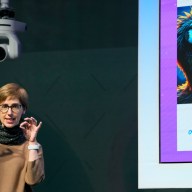Local poet-performer Jade Sylvan says that in this age of Facebook, Twitter and YouTube, we try to leave our legacies on the Internet. We all seem to strive to be documented, remembered. This Friday, at her “Here and Now: Ephemera” show, she is tossing that whole idea to the pyre: literally.
The incendiary art show will include poetry, photography, live coding, burlesque and a lecture by a Harvard physicist on the concept of ephemera.
After the show, all of the artists will burn their “babies” based on the idea that everything eventually changes and decays anyway.
The show will not be recorded or documented in any way.
Sylvan organized the show based on a ritual started by poet Tony Brown. Brown hosted “burn features,” where featured poets would read a new set of work, then burn it afterward.
Sylvan adopted the idea and expanded it.
“I wanted it bigger and just more inclusive than just having one writer lead. I guess more accessible,” Sylvan says.
As far as the show incorporating such disparate disciplines as physics, poetry and burlesque, Sylvan just says, “It all just sort of fits together. I wanted to give people different ways to view the same thing.”
Poets Corrina Bain, Tony Brown and Nicole Terez Dutton — along with novelist Joseph Torra, photographer Caleb Cole and coder Dawn Gabriel — will be joining Sylvan in the show-and-burn.
Despite her excitement about the show, Sylvan still recognizes the difficulties of asking artists to burn their new work.
“It’s just hard, writing something, knowing you’re going to destroy it, not being able to do anything with it after this night,” she says.
Still, Sylvan hopes to make this show into an annual affair.
Ephemera, what is it?
Part of Sylvan’s interest in ephemera has its roots in the differences between Eastern and Western theological viewpoints, and how they influence even our secular culture.
“In Western religions, generally speaking, they want things to stay permanent. They view the afterlife sort of as the immortal soul — things staying forever. In Eastern religions, they tend to be more cyclical, like more about reincarnation and the impermanence of existence as something to derive meaning from,” she says.














